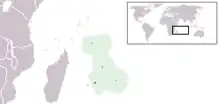Mauritius
The Republic of Mauritius is an island nation in the Mascarene Islands. It includes Rodrigues, Agaléga and St. Brandon as well as Mauritius.[3] It was formerly ruled by the European countries: France, Portugal, and the United Kingdom, but is now independent from these all European Colonies.
Republic of Mauritius Repiblik Moris République de Maurice | |
|---|---|
 Coat of Arms
| |
| Motto: "Stella Clavisque Maris Indici" (Latin) "Star and Key of the Indian Ocean" | |
| Anthem: "Motherland" | |
 | |
| Capital and largest city | Port Louis 20.2°S 57.5°E |
| Official languages | None (de jure) |
| Vernacular language | Mauritian Creole |
| De facto languages |
|
| Government | Parliamentary Republic |
| Prithvirajsing Roopun | |
| Pravind Jugnauth | |
| Legislature | Parliament |
| National Assembly | |
| Independence | |
• from the United Kingdom | 12 March 1968 |
• Republic | 12 March 1992 |
| Area | |
• Total | 2,040 km2 (790 sq mi) (179th) |
• Water (%) | 0.05 |
| Population | |
• 2015 estimate | 1,323,483 (154th) |
• 2000 census | 1,179,137 |
• Density | 630/km2 (1,631.7/sq mi) (18th) |
| GDP (PPP) | 2011 estimate |
• Total | $19.008 billion[1] |
• Per capita | $14,746[1] |
| GDP (nominal) | 2011 estimate |
• Total | $10.299 billion[1] |
• Per capita | $7,989[1] |
| HDI (2011) | high · 77th |
| Currency | Mauritian rupee (MUR) |
| Time zone | UTC+4 (MUT) |
| UTC+4 ((DST not observed)) | |
| Date format | dd/mm/yyyy (AD) |
| Driving side | left |
| Calling code | 230 |
| ISO 3166 code | MU |
| Internet TLD | .mu |
Port Louis is its capital. In the 2000 census, the country had a population of 1,178,848 people.[4] The country is prosperous, and trades mainly with South Africa and Indian Sub Continent. The island of Mauritius was the home of the dodo.
Location
The island is in the southwest Indian Ocean. It is about 900 km (559 mi) east of Madagascar. The country includes the island of Mauritius as well as the islands of St. Brandon, Rodrigues and the Agalega Islands. Mauritius is part of the Mascarene Islands along with the French island of Réunion 200 km (124 mi) to the southwest.
Flag
The Mauritian flag is made up of four colours of equal width. The colours represent the following:
- Red represents freedom and independence,
- Blue is for their Indian Ocean which surrounds the island,
- Yellow for the sun, and
- Green for their agriculture.
History
Mauritius, an island of volcanic origin sheltered by barriers of coral reefs forming natural, safe, crystal clear lagoons, has long been a dream destination. Known to the Arabs as early as the 10th century, but officially explored by the Portuguese in the 16th century and subsequently settled by the Dutch in the 17th century. The Dutch were the ones who named the island in honor of Prince Maurits van NASSAU. Mauritius was occupied successively by the Dutch (1598-1712) and later by the French (1715-1810). The French assumed control in 1715, developing the island into an important naval base overseeing the Indian Ocean trade, and establishing a plantation economy of sugar cane. The British captured the island in 1810, during the Napoleonic Wars through the Treaty of Paris. Mauritius remained a strategically important British naval base, and later on, an air station playing an important role during World War II for anti-submarine and convoy operations, as well as the collection of signals intelligence. On 12 March 1968, Mauritius became Independent.
Related pages
References
- "Mauritius". International Monetary Fund. Retrieved 5 February 2012.
- "Human Development Report 2010" (PDF). United Nations. 2010. Archived from the original (PDF) on 21 November 2010. Retrieved 5 February 2012.
- "Written Statement of the Republic of Mauritius" (PDF). 1. International Court of Justice. 1 March 2018: 23–24. Archived from the original (PDF) on 16 December 2018. Retrieved 3 November 2019.
{{cite journal}}: Cite journal requires|journal=(help) - Central statistics Office: Republic of Mauritius Archived 2008-04-24 at the Wayback Machine Resident population and resident population in private households by geographical district single year of age and sex
